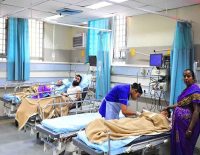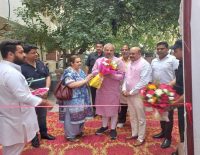Epilepsy: India home to 15 Mln people, multi-disciplinary approach way ahead

On the occasion of World Epilepsy Day, celebrated on second Monday of February, experts emphasize the need for awareness and timely intervention with new age treatment and multi-disciplinary approach. Headaches are the most common neuro problem.
Epilepsy is a neurological disorder characterized by abnormal brain waves leading to recurrent seizures. It is estimated that over 15 million people in India suffer from epilepsy. Out of 15 million, 20-30 % patients fall under drug resistant category. Experts asserted that with timely and proper treatment, people with epilepsy can lead normal lives.
Epilepsy is broadly divided into categories such as Generalized Epilepsy and Partial (Focal) Epilepsy. Genetic or birth defects, oxygen deprivation or hypoxic sequelae, genetics, brain infections, head injury, stroke, and brain tumors, among others are the main causes of epilepsy.
“The signs and symptoms of a seizure vary, so you may not always know what to look for. In certain cases, this can even be seen as typical behaviour. This might cause delays in the diagnosis and management of epilepsy. The physical signs and symptoms that might suggest that a person is suffering a seizure include excessive jerking or twitching in a single body area or throughout the body, unexpectedly plummeting down, exhibit blank stares or lacks awareness of surroundings, unnatural behaviour, such as wandering. Also, they may tend to pick adjacent objects, such as clothing or air, or continuously smack their lips. Verbal signs and symptoms, pointing towards a seizure include an odd odor or foul taste in tongue, a tingling or numb feeling or confusion,” said Dr. Shivraj Hunge, Consultant-Neurologist, Jupiter Hospital Pune.
“Anti-seizure drugs are one type of treatment option; however, it may take some time to discover the proper prescription and dosage. In order to treat the root causes of drug-resistant epilepsy, surgery is also being investigated to remove brain tumours. When the cause of seizures is unknown, deep brain stimulation, or DBS, may be necessary,” said Dr Praveen Gupta, Principal Director & Chief of Neurology, Fortis Hospital.
Access to specialized Epilepsy Centers has a new momentum in combating epilepsy. There are several surgical options such as Resective surgery for removing the specific brain area responsible for seizures.
“In India, several super-speciality hospitals now offer advanced treatments for epilepsy primarily include epilepsy surgery. We have now options like resective surgery, vagus nerve stimulation, and minimally invasive procedures, alongside advanced comprehensive diagnostic tools like high-density EEG and brain mapping for accurate localization of seizure foci; , particularly in children; and advanced neuroimaging techniques like PET scans and MEG are used to further refine diagnosis and surgical planning,” said Dr. Madhukar Bharadwaj, Director and HOD, Neurology, Aakash Healthcare, New Delhi.
“We have made significant progress in diagnostic technologies. A thorough process is used for diagnosis, which includes along with physical examination, a number of tests, including as blood tests, bedside EEGs, video EEGs, brain CT scans, and MRIs. These examinations and testing aid in determining probable reasons and developing suitable treatment plans,” added Dr. Aakaar Kapoor, CEO & Lead Medical Advisor, City X- Ray and Scan Clinic.







